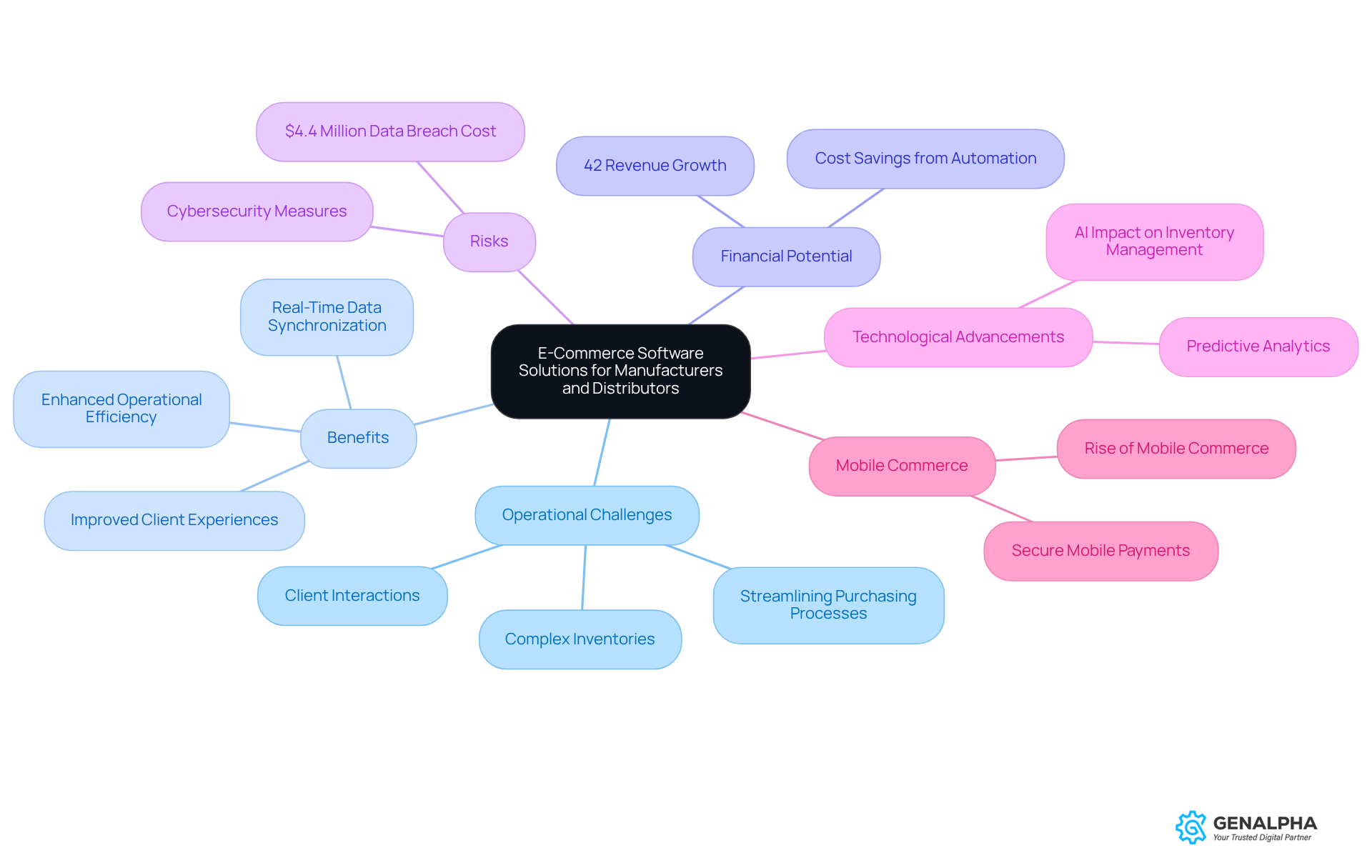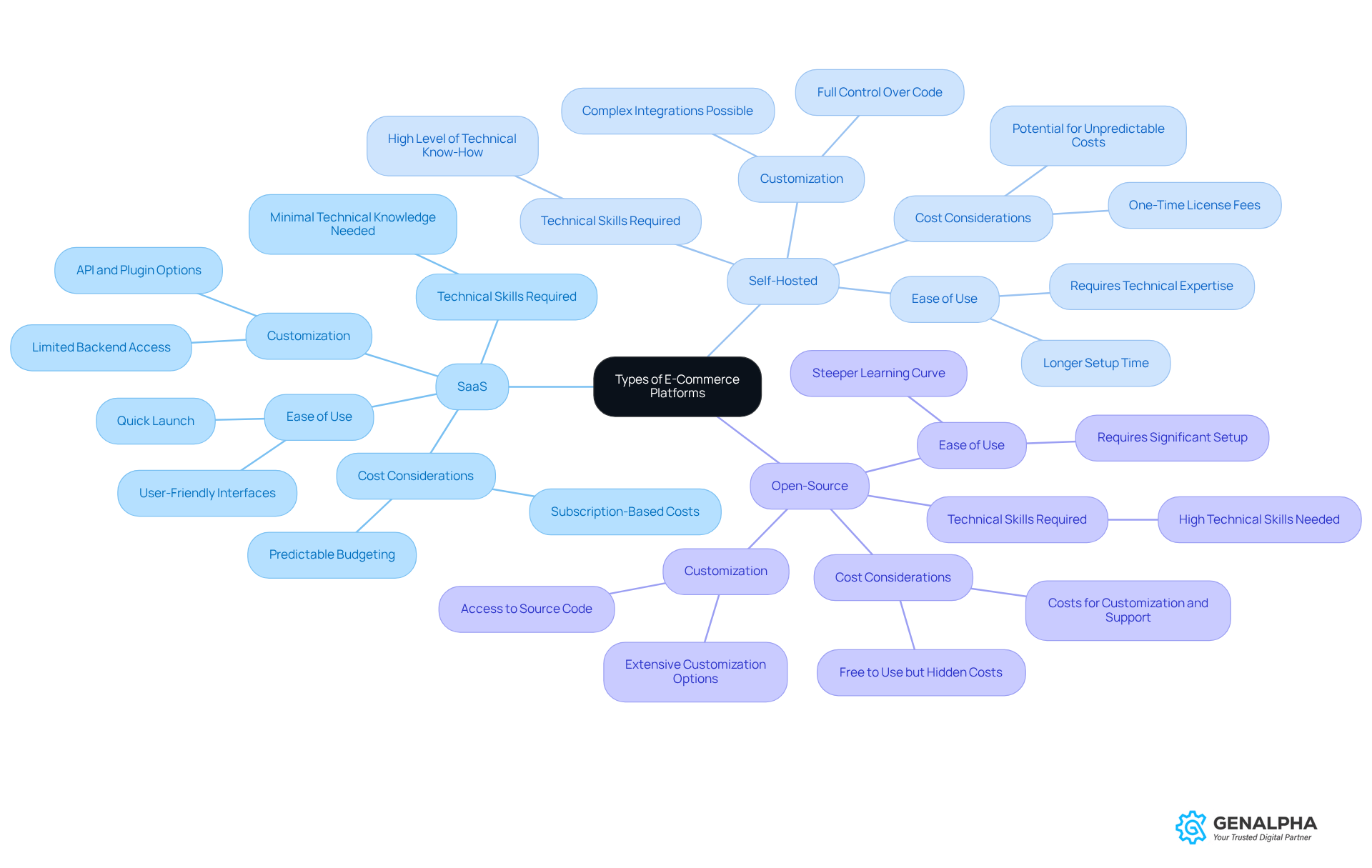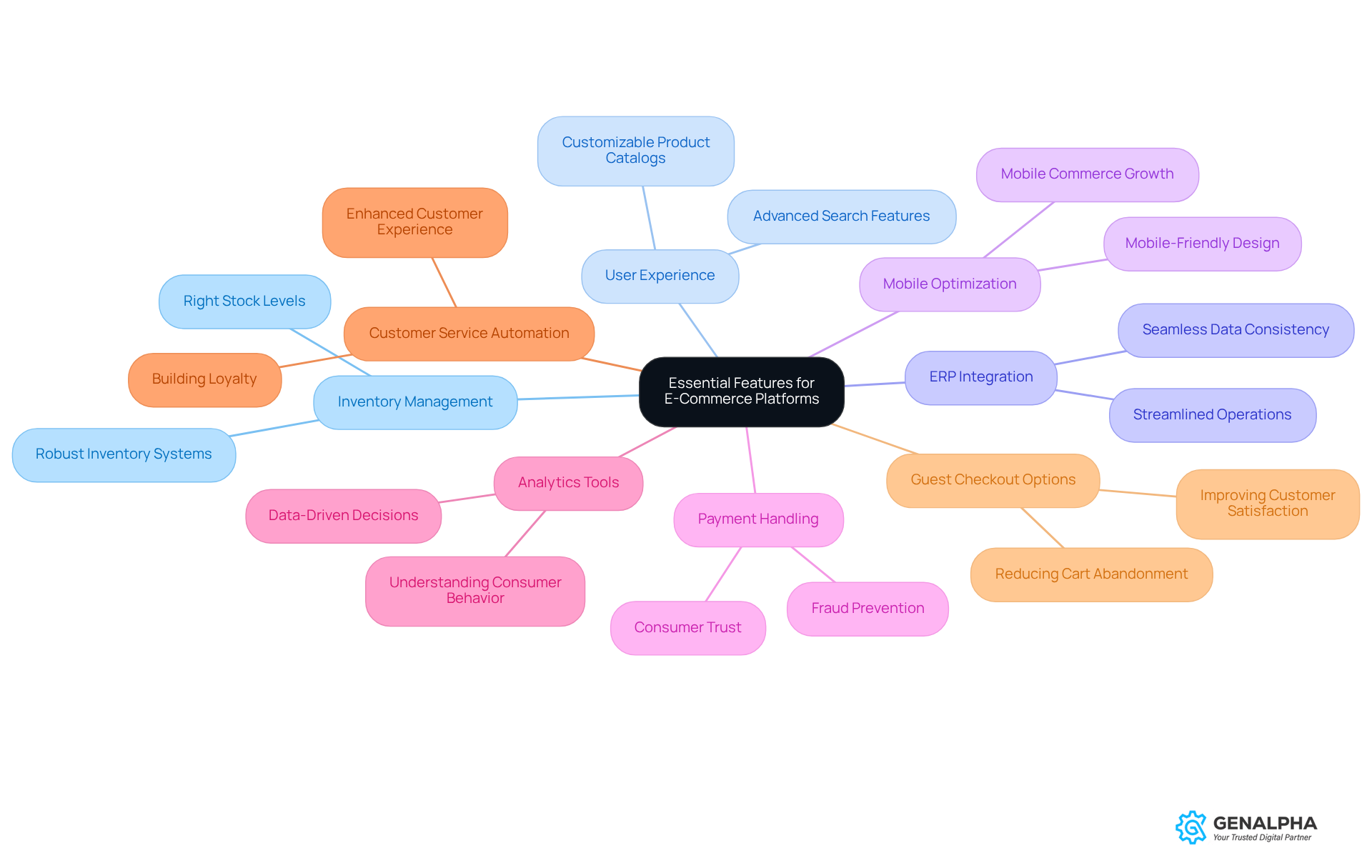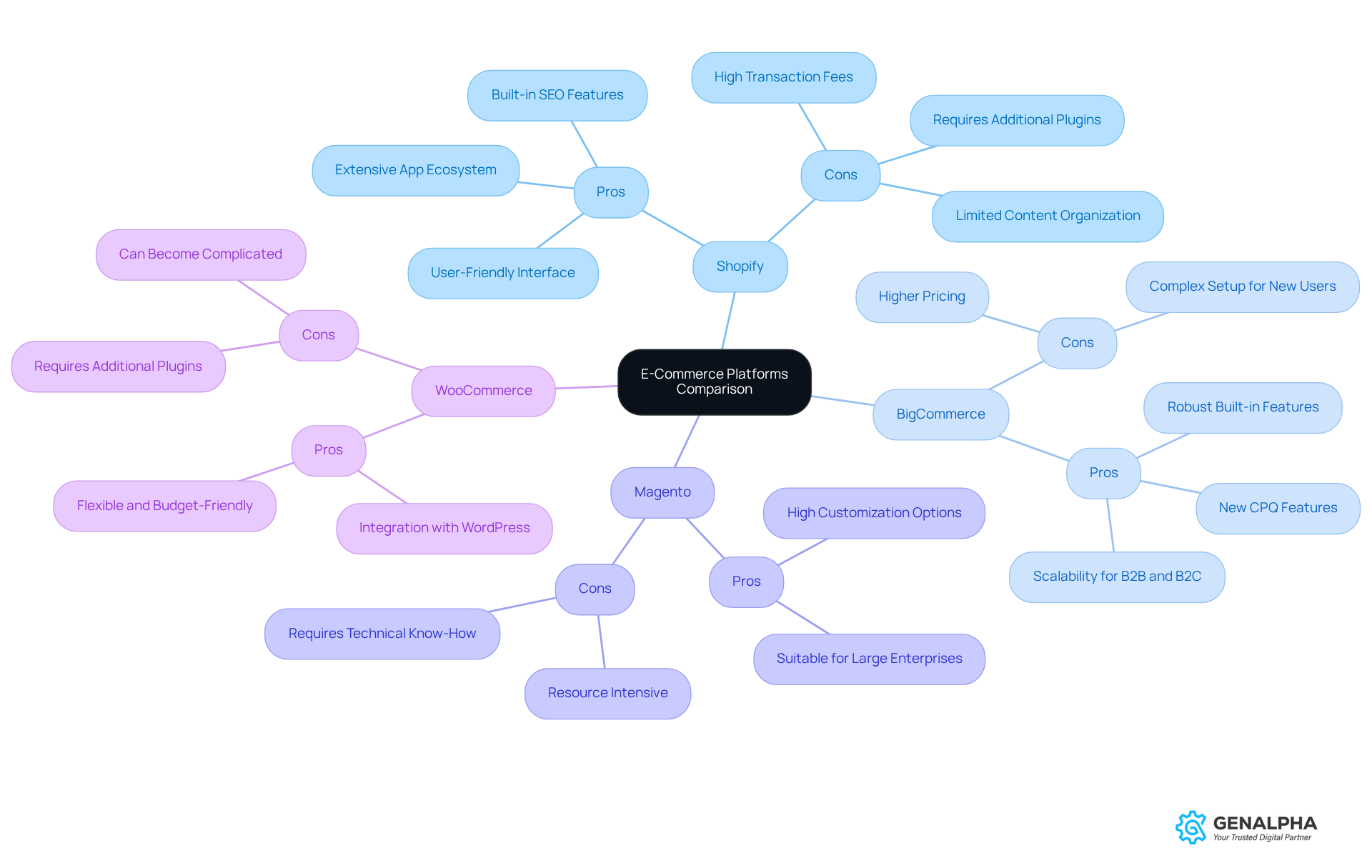Overview
When it comes to e-commerce solution software for manufacturers, it’s more than just a tool; it’s a game changer for tackling operational challenges and boosting client interactions. This is especially true in the world of B2B transactions, where large orders and complex inventories are the norm. Have you ever wondered how the right platform can make a difference?
There are several types of platforms to consider:
- SaaS
- Self-hosted
- Open-source
Each comes with its own set of pros and cons. For example, SaaS solutions are often user-friendly and require less maintenance, while self-hosted options give you more control. On the other hand, open-source platforms can be customized to fit your unique needs but may require more technical know-how.
The key takeaway? Selecting a solution that aligns with your specific needs and capabilities is crucial for optimal online sales growth. So, what are you waiting for? Dive into the options and find the perfect fit for your business!
Introduction
In today’s digital marketplace, manufacturers and distributors are up against a big challenge: adapting to e-commerce trends that can really impact their bottom line.
Have you ever wondered how these trends can change the game for your business?
This article takes a closer look at the essential features and types of e-commerce solution software that can help streamline operations, boost customer satisfaction, and ultimately drive revenue growth.
With so much at stake, how can you navigate the sea of platforms out there and pick the one that fits your unique business needs best?
Understanding E-Commerce Software Solutions for Manufacturers and Distributors
E-commerce solution software specifically tailored for producers and distributors plays a crucial role in tackling operational challenges. Think about it: managing complex inventories, enhancing client interactions, and streamlining purchasing processes can be tough. That’s where these systems come in—they're specifically designed to meet the needs of B2B transactions, which often involve large orders, personalized pricing, and detailed product specifications. Understanding these needs is key for manufacturers and distributors who want to boost their online sales and keep their clients happy.
Now, imagine having the perfect online retail platform. It not only integrates smoothly with your existing ERP systems but also improves inventory management through real-time data synchronization. Plus, with advanced analytics tools at your fingertips, you can make informed, data-driven decisions that enhance operational efficiency and elevate client experiences.
As industry leaders emphasize, embracing online commerce isn't just an option anymore; it's essential for producers to thrive in today's competitive landscape. Did you know that companies with eCommerce storefronts anticipate a whopping 42% revenue growth in the coming year? That really highlights the financial potential here!
On the flip side, we can’t ignore the risks. With the average in eCommerce sitting at $4.4 million, having robust security measures and compliance with regulations is absolutely critical. Manufacturers should also think about how to communicate strategically and retrain traditional sales teams, who might see eCommerce as a threat.
And let’s not forget about the game-changing impact of AI technologies on inventory management and customer experience. It’s vital for manufacturers to stay in the loop with these advancements. Lastly, as mobile commerce continues to grow, secure mobile payment options are becoming increasingly essential for B2B buyers. This really underscores the need for comprehensive e-commerce solution software. So, are you ready to take the plunge into the world of e-commerce?

Types of E-Commerce Platforms: SaaS, Self-Hosted, and Open-Source Solutions
E-commerce solution software can be grouped into three main types: Software as a Service (SaaS), self-hosted, and open-source solutions. SaaS options, like Shopify and BigCommerce, are fantastic for producers who want to establish an online presence quickly, even if they don't have much technical expertise. These systems come with user-friendly interfaces and are scalable, making them ideal for businesses that value ease of use and quick deployment. Did you know that, according to industry insights, SaaS solutions can get businesses live in just hours or days? This is crucial for producers looking to grab market opportunities fast.
On the flip side, self-hosted solutions like WooCommerce give producers more customization and control over their online stores. However, they do require a higher level of technical know-how and ongoing maintenance, which can be a bit daunting for some organizations. The total cost of ownership (TCO) for self-hosted solutions can vary quite a bit, often leading to unpredictable expenses due to hosting and development costs.
Then we have open-source systems, like Magento, which offer significant flexibility and customization options. This allows producers to tailor their online solutions to specific operational needs. But, here's the catch: these systems demand substantial development resources and technical skills, which might not be feasible for everyone. As e-commerce specialists often point out, choosing the right e-commerce solution software should align with the unique needs and capabilities of the producer or distributor, considering factors like budget, technical resources, and long-term growth plans.
To highlight the practical benefits, many producers have successfully adopted SaaS solutions, leveraging their built-in features and support for rapid scaling. Current trends indicate a growing preference for SaaS among producers, driven by the need for quick implementation and user-friendliness. Ultimately, of each type is key to making an informed decision that aligns with your business's strategic goals. So, which option feels right for you?

Essential Features for E-Commerce Platforms: What Manufacturers and Distributors Need
In the fast-paced world of online shopping, it’s essential for producers and suppliers to focus on what really matters: operational efficiency and client satisfaction. Think about it—having a robust inventory management system is key. It helps businesses keep the right stock levels and react quickly to what customers want. Plus, customizable product catalogs and advanced search features make it easy for users to find exactly what they’re looking for, enhancing their shopping experience.
But that’s not all! Seamless integration with existing ERP systems is a must. It streamlines operations and keeps data consistent across platforms. With mobile commerce sales expected to hit a whopping $856 billion by 2027, is crucial. After all, more and more consumers are shopping on their smartphones. And let’s not forget about payment handling; it’s vital to ensure consumer trust, especially with e-commerce fraud losses averaging $101 these days.
Now, let’s talk about analytics tools. These are your best friends when it comes to understanding consumer behavior and sales trends. They can help you make informed, data-driven decisions that lead to better inventory management and targeted marketing strategies. And don’t overlook features that support digital warranty management and customer service automation—they can really elevate the overall customer experience, building loyalty and encouraging repeat business.
As Mike Mayer, CEO of Main Event Digital, puts it, 'Selecting the appropriate e-commerce solution software is a crucial choice for distributors aiming to thrive in the digital era.' Plus, organizations that adopt e-commerce solution software for their enterprise online commerce systems see an average ROI of 291% over three years. That’s a strong argument for investing in solid online retail solutions! And here’s a tip: incorporating guest checkout options can significantly reduce cart abandonment rates, making for happier customers all around. So, what’s holding you back from enhancing your online shopping experience?

Comparative Analysis of Leading E-Commerce Platforms: Pros and Cons
In the bustling world of online retail, producers and suppliers have some exciting choices to consider with e-commerce solution software.
- Take Shopify, for example. It's super user-friendly and boasts a vast app ecosystem, making it a go-to for newcomers to e-commerce. But here's the catch: it might not have all the advanced features needed for those complex B2B transactions.
- On the flip side, we have BigCommerce. This platform comes packed with and scalability, making it a solid pick for both B2B and B2C markets. Just a heads up, though—it can be pricier than some other options.
- Then there's Magento, also known as Adobe Commerce. If customization is what you're after, this is the way to go, especially for larger enterprises with specific needs. But, be prepared; it demands a good amount of technical know-how and resources to manage effectively.
- Lastly, we can't forget WooCommerce. It's flexible and budget-friendly, but it might require some extra plugins to unlock its full potential, which could complicate things a bit for users.
So, what's the takeaway here? Each type of e-commerce solution software has its own unique strengths and weaknesses. The best choice really hinges on the specific needs and resources of the manufacturer or distributor. What do you think would work best for you?

Conclusion
E-commerce solution software is a must-have for manufacturers and distributors trying to navigate the tricky waters of online sales. By using tailored platforms, these businesses can easily manage their inventory, improve customer interactions, and make purchasing processes a breeze. The shift toward online commerce isn’t just a nice-to-have; it’s essential for manufacturers who want to stay competitive and tap into the huge revenue growth potential that e-commerce brings.
Throughout this article, we’ve highlighted some key insights about the different types of e-commerce platforms available, like SaaS, self-hosted, and open-source solutions. Each type comes with its own set of advantages and challenges, so it’s super important for manufacturers to think about their specific needs, technical skills, and budget constraints when picking the right platform. Don’t forget about essential features like inventory management, mobile optimization, and strong analytics tools—they’re crucial for boosting operational efficiency and keeping customers happy.
Ultimately, making the leap to e-commerce is a game-changing opportunity for manufacturers and distributors. As the landscape keeps evolving, choosing the right e-commerce solution software not only boosts business performance but also sets organizations up for long-term success. So, why wait? Now is the perfect time to dive into these innovative platforms, as the potential for growth and better customer engagement is massive. Manufacturers are encouraged to take bold steps toward integrating e-commerce into their operations, ensuring they stay ahead in this digital revolution.
Frequently Asked Questions
What is the purpose of e-commerce software solutions for manufacturers and distributors?
E-commerce software solutions are designed to help manufacturers and distributors manage operational challenges such as complex inventories, client interactions, and purchasing processes, particularly in B2B transactions.
What features should manufacturers and distributors look for in e-commerce software?
Manufacturers and distributors should look for features that include smooth integration with existing ERP systems, real-time data synchronization for inventory management, and advanced analytics tools for making data-driven decisions.
Why is embracing online commerce essential for manufacturers today?
Embracing online commerce is essential because it helps manufacturers thrive in a competitive landscape, with companies that have eCommerce storefronts anticipating a 42% revenue growth in the coming year.
What are the risks associated with e-commerce for manufacturers?
The risks include the potential for data breaches, which can average $4.4 million in costs, highlighting the need for robust security measures and compliance with regulations.
How should manufacturers approach their sales teams regarding e-commerce?
Manufacturers should communicate strategically and consider retraining traditional sales teams, who may perceive eCommerce as a threat, to ensure they understand its benefits and opportunities.
What role does AI technology play in e-commerce for manufacturers?
AI technologies have a significant impact on inventory management and customer experience, making it essential for manufacturers to stay updated on these advancements.
Why are secure mobile payment options important in B2B e-commerce?
As mobile commerce continues to grow, secure mobile payment options are increasingly essential for B2B buyers, underscoring the need for comprehensive e-commerce solution software.




